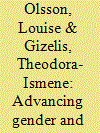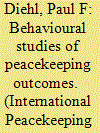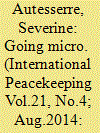| Srl | Item |
| 1 |
ID:
134787


|
|
|
|
|
| Summary/Abstract |
Research on gender and peacekeeping has been revolving around two strands of questions. First, what form of peace does peacekeeping contribute to establishing? And second what are the gender dimensions of how peacekeeping is implemented? Subthemes underlying these questions are concerned with whether women's participation and gender aspects of security should be integral parts of the post-war society and the effectiveness of current gender mainstreaming and balancing policies. In this commentary we argue that there has been considerable progress in the field of gender and peacekeeping. Feminist research has raised questions about the understanding and conceptualisation of peace and security, while empirical research systematically explores the gender dimensions of peacekeeping. Yet, in order for research on gender and peacekeeping to progress, it needs to address issues such as theory underdevelopment, lack of data and continued exclusion from mainstream research. The commentary highlights as an area of particular concern the failure of existing research to find common ground and outlines opportunities of building bridges between empirical and feminist researchers.
|
|
|
|
|
|
|
|
|
|
|
|
|
|
|
|
| 2 |
ID:
134783


|
|
|
|
|
| Summary/Abstract |
This article provides an overview of peacekeeping studies in the behavioural tradition, namely those driven by a theoretical orientation to explain causal relationships and ones in which those theoretical arguments are tested by reference to historical cases, often in a large-N and statistically dependent research design. Critiques of existing studies focus on how the importation of theoretical approaches and the availability of data have conditioned existing research. Several pathways for future research are outlined, including better theoretical development, broader and more varied indicators of peacekeeping success, greater attention to unintended consequences, adoption of spatial frameworks of analysis, and paying greater attention to non-UN operations.
|
|
|
|
|
|
|
|
|
|
|
|
|
|
|
|
| 3 |
ID:
134784


|
|
|
|
|
| Summary/Abstract |
In the past 15 years, scholars have started studying the local and micro-level dimensions of peacekeeping. They have investigated the nature and effectiveness of bottom-up peacebuilding, assessed the local versus national impacts of peacekeeping interventions and studied the decentralized actions of international peacebuilders on the ground. This commentary shows that, despite the approach's limitations, delving into these three topics opens up fruitful areas for further research, in particular analysing micro-to-macro linkages, evaluating peacekeeping's subnational impacts across cases, explaining peacebuilding successes and understanding the causes of peace itself.
|
|
|
|
|
|
|
|
|
|
|
|
|
|
|
|
| 4 |
ID:
092126


|
|
|
|
|
| Publication |
2009.
|
| Summary/Abstract |
Despite a growth in social studies of peacekeeping, there has been little written on field experiences in such contexts. This article examines the role of the researcher in influencing the research process and product in two peacekeeping sites, Liberia and Kosovo. Although researchers are often positioned in powerful ways vis--vis researchees, the multiplicity and complexity of their positionality are often overlooked. By drawing on examples from team research conducted, the article suggests that these positionings give rise to unconventional and contradictory power relations. By reflecting on the role of the researcher(s) and the politics of research itself, we hope to engender more conscientious peacekeeping research.
|
|
|
|
|
|
|
|
|
|
|
|
|
|
|
|